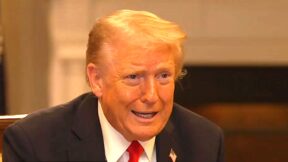Independent Journalism Will Pay the Price as Trump and Musk Squash USAID

Alex Brandon/AP Photos
As President Donald Trump and billionaire Elon Musk slash USAID funding, they argue that the money is wasted on hyper-progressive culture wars. This narrative absurdly misrepresents the strategic importance of USAID’s work — and among the most crucial aspects is the wide-ranging effort to foster independent media in emerging democracies. Americans should know how devastating this would be.
To illustrate the point, a good test would be Armenia, which I know well through numerous visits and an array of business and personal collaborations with apolitical pro-democracy NGOs, think tanks and volunteer groups. It is a country at a crossroads between an authoritarian past and democratic aspirations. It is a former communist republic within the Soviet Union that finds itself in the middle of a genuine and difficult pivot toward the West.
Crucial to the democratization which the country entered after its Velvet Revolution in 2018 is the development of a professional and independent media landscape. I know firsthand how important USAID is to this – and how the impact of the cuts is already being felt.
HETQ/Media Factory, a training ground for investigative journalists, is struggling to keep its doors open. Known for producing reporters who expose corruption and hold power accountable, this organization risks closure without USAID support. Internews Media Program, a vital partner in strengthening local journalism, has been forced to shut down its office and lay off six employees, with the few remaining team members working remotely. Its leader, has left the country, signaling a severe setback for independent reporting in a region vulnerable to disinformation.
The American University of Armenia, which is a successor example to other countries and a shining jewel in the crown of U.S. soft power, faces cuts to a critical and long-awaited graduate journalism program.
Meanwhile, the National Endowment for Democracy, one of the largest media grant organizations, has seen a massive budget cut, severely affecting local outlets like EVN, which is by far the premier source of deep investigation and long-form independent analysis in the country. The loss of funding has led to the cancellation of the influential Media Festival in 2025 and threatens the sustainability of Radio Free Europe/Radio Liberty’s Armenian service. Freedom House, another cornerstone of media freedom advocacy which operated in the country, is also facing extremely severe financial challenges, jeopardizing its mission to safeguard press freedoms.
The blithe derailing of all this – with the outrageously false narrative that it is somehow relates to fighting wokeness – risking not only Armenia’s democratic trajectory but also U.S. strategic interests in the region. For these are not merely budgetary issues — they represent a strategic retreat from supporting democracy.
A free and professional media ecosystem is indispensable for emerging democracies. It ensures accountability, exposes corruption, and educates citizens, enabling them to make informed decisions. In fragile democracies like Armenia, where influence from nearby Russia and its disinformation campaigns loom large, independent media is the frontline defense against authoritarian narratives.
Indeed, there is a flip side to fostering free media. Authoritarian regimes worldwide — from Russia to Hungary and Turkey — have shown that one of their first steps toward consolidating power is to crush independent journalism. In Russia, this process began two decades ago, laying the groundwork for a full-blown dictatorship and a disinformation ecosystem that now threatens democracies globally through bot attacks and propaganda.
Armenia’s current struggle underscores the importance of maintaining independent media. Without USAID’s support, such outlets face financial ruin, making them vulnerable to co-optation by oligarchic interests or state censorship. The void left behind would be filled by disinformation and propaganda. In the most dismal outcome, this risks pushing Armenia back toward the Russian orbit and perhaps its own authoritarianism.
The consequences extend beyond Armenia’s borders: countries all over the world, including neighboring Georgia, are beset by similar challenges. Helping them – and their media – is not merely charity; it is a strategic investment in soft power. By fostering informed citizenries in emerging democracies, the U.S. reinforces democratic norms and counters authoritarian influence.
The current assault on USAID reflects a broader ideological shift. By framing foreign aid as wasteful, Trump and Musk are actually questioning America’s role as a global leader in promoting democracy. Not all criticisms are without merit – like any large bureaucracy USAID has inefficiencies – but to dismiss its work outright ignores the strategic value it brings in countering authoritarianism.
The question then becomes: Does the U.S. still wish to lead the free world and champion democratic values, which include the global fostering of free media? If so, abandoning USAID’s strategic investments would be a colossal error which would cede influence to authoritarian powers like Russia and China and allow them to gleefully enter the vacuum. It would be a betrayal of the post-WWII mission upheld by every U.S. administration, Republican and Democrat alike.
Then again, if the U.S. is now aligning itself with autocrats and abandoning the goal of spreading democracy, then the budget cuts make perfect sense. If supporting authoritarianism is the new strategic aim, why, indeed, invest in democratic resilience? This appears to be the direction under Trump, with his administration’s now-open support for Russia against Ukraine and indifference toward America’s traditional European allies.
Ultimately, USAID and its media development efforts is about the identity of the United States in the world. If Congress – which in fact does have the power of the purse – follows Trump’s lead, it will signal not only a retreat from democratic leadership but an alignment with authoritarianism.
Dan Perry was the top AP editor in Europe and Africa, in the Middle East, and in the Caribbean. He was chairman of the Foreign Press Association in Jerusalem. He writes frequently on world affairs, technology, and media, is the author of two books on the Middle East. Follow him at danperry.substack.com.
This is an opinion piece. The views expressed in this article are those of just the author.




